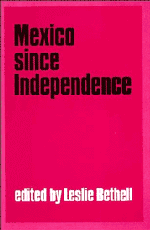Book contents
- Frontmatter
- Contents
- List of maps
- Preface
- 1 From independence to the Liberal Republic, 1821–1867
- 2 The Liberal Republic and the Porfiriato, 1867–1910
- 3 The Mexican Revolution, 1910–1920
- 4 Revolution and reconstruction in the 1920s
- 5 The rise and fall of Cardenismo, c. 1930 – c. 1946
- 6 Mexico since 1946: Dynamics of an authoritarian regime
- Bibliographical essays
- Index
6 - Mexico since 1946: Dynamics of an authoritarian regime
Published online by Cambridge University Press: 05 June 2012
- Frontmatter
- Contents
- List of maps
- Preface
- 1 From independence to the Liberal Republic, 1821–1867
- 2 The Liberal Republic and the Porfiriato, 1867–1910
- 3 The Mexican Revolution, 1910–1920
- 4 Revolution and reconstruction in the 1920s
- 5 The rise and fall of Cardenismo, c. 1930 – c. 1946
- 6 Mexico since 1946: Dynamics of an authoritarian regime
- Bibliographical essays
- Index
Summary
Mexico stands out as a paragon of political stability within contemporary Latin America. There have been no successful military coups since the nineteenth century and hardly any serious attempts since the Revolution of 1910–20. Presidential successions have become genteel negotiations within the semi-official party, the Partido Revolucionario Institucional (PRI), which has dominated the electoral arena for more than half a century. Civilians have gained control of the ruling apparatus. Consensus appears to prevail on most policy questions, and the Constitution of 1917 – forged in the heat of armed conflict – has continued to provide the regime an aura of legitimacy. Claiming a revolutionary heritage and wielding a practical monopoly over the instruments of power, the Mexican state has appeared to function smoothly, steadily and (in its own way) efficiently. The consequent achievement of stability has thus come to be hailed as the political component of the post-war ‘Mexican miracle’.
Indeed, the perception of Mexico's political stability has imbued much of the scholarly literature on contemporary Mexico with a tacit presumption of continuity, a sense almost of timelessness. There tends to be an unspoken assumption that nothing much has changed in Mexican politics since the late 1930s, much more attention being given to the workings of the system and the mechanisms of authority than to historical events or discrete occurrences; most existing literature reveals a general, abstract quality. This may illustrate one of the implicit biases of what has come to be called ‘systems analysis’ in political science: preoccupation with the maintenance of the political system rather than with patterns of transformation. Viewed in this perspective, post-war Mexico often looks flat and one-dimensional.
- Type
- Chapter
- Information
- Mexico since Independence , pp. 321 - 396Publisher: Cambridge University PressPrint publication year: 1991
- 16
- Cited by



